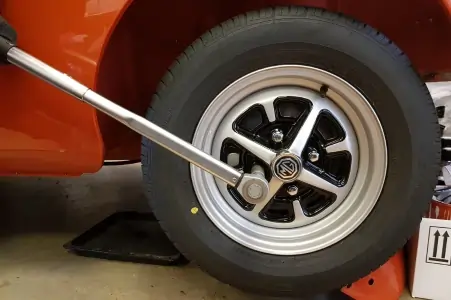
You might see torque wrench and torque screwdriver calibrations as an unnecessary additional cost, but in reality the truth could not be further from this. After all, it’s these calibrations that make sure your torque tools are applying the correct amount of torque, and ultimately keeping your fasteners attached and doing their job. For this reason, in some industries such as road transport, it is a legal requirement to perform these torque calibrations at regular intervals.
In brief, torque wrench calibration is the process which ensures your torque wrenches are performing reliably, giving you accurate and repeatable readings to a predetermined standard such as BS EN ISO 6789:2017. We will discuss these standards a bit later on.
BS EN ISO 6789:2017 recommends that you calibrate your torque wrench every 12 months or every 5,000 operations, whichever comes around first.
The truth is however that the frequency of your torque tool calibrations should depend on the impact it would have on you if these tools are not applying the correct amount of torque. For example, you should calibrate your torque tools more frequently (e.g. every 6 months) if the tool is required for particularly high value or critical operations with high consequences such as in the aerospace, energy or automotive industry. Calibration should also be performed more frequently if the history of a tool indicates it has been trending out of calibration in the past.

There are also a number of scenarios where a torque wrench's calibration should be performed as soon as possible to prevent your tool from applying incorrect torque levels without you knowing. These include:
- If the torque wrench is dropped or banged against a hard surface.
- If the torque wrench is overloaded.
- If the torque wrench is used in extreme weather conditions such as abnormally hot, cold, rainy or humid climates.
- If there is a noticeable change in the performance of the torque wrench during use.
- If the torque wrench is poorly maintained (we will go into what this involves shortly).


The same rules apply for torque screwdrivers, with ISO 6789:2017 recommending recalibration between every 12 months or 5,000 operations, whichever comes first. This is unless one of the scenarios listed above were to take place, or the user deems the screwdriver is used in critical operations with a high consequence should it be reading incorrectly.
The same rules apply for torque screwdrivers, with ISO 6789:2017 recommending recalibration between every 12 months or 5,000 operations, whichever comes first. This is unless one of the scenarios listed above were to take place, or the user deems the screwdriver is used in critical operations with a high consequence should it be reading incorrectly.
The ratchet on the torque wrench should be regularly cleaned, lubricated and visually checked for signs of wear and tear such as worn parts and old grease. These should be accompanied by occasional checks to ensure the screws in the head of the ratchet are still tight.
Verification is an interim measure to check that the tool is performing as required at the time of use. This is particularly useful before a work shift as it determines if the tool is fit to carry out its duty for a short period of time. These verifications are also a good way to spot early signs that your tool could be falling out of tolerance.
There are several international standards used to calibrate torque tools, with one of the main ones being ISO 6789. We’ve mentioned the latest edition of the ISO 6789 standard a few times already, BS EN ISO 6789:2017. The most comprehensive version of the ISO 6789 standard yet, ISO 6789:2017 takes uncertainties into account in order to obtain more accurate results for the calibration than its 2003 predecessor.
ISO 6789:2003 is a much simpler, but now obsolete standard, not containing any uncertainty calculations meaning it needs far less operations to meet the standard. However getting a torque tool calibrated to ISO 6789:2003 standards does mean compromising on the accuracy of the results of the calibration when compared to the 2017 version.
In America, ASME B107.300 is often favoured by calibration laboratories, and much like ISO 6789:2003, ASME B107.300 does not contain uncertainty measurements within the calibration process.

As torque wrenches and screwdrivers are precision tools, it is highly recommended that they are calibrated and verified on reputable and accurate equipment to ensure believable results. Advanced Witness Systems Ltd design and manufacture a range of equipment for torque tool calibration and verification, designed with ease of use and accuracy in mind to meet international standards such as ISO 6789:2017.